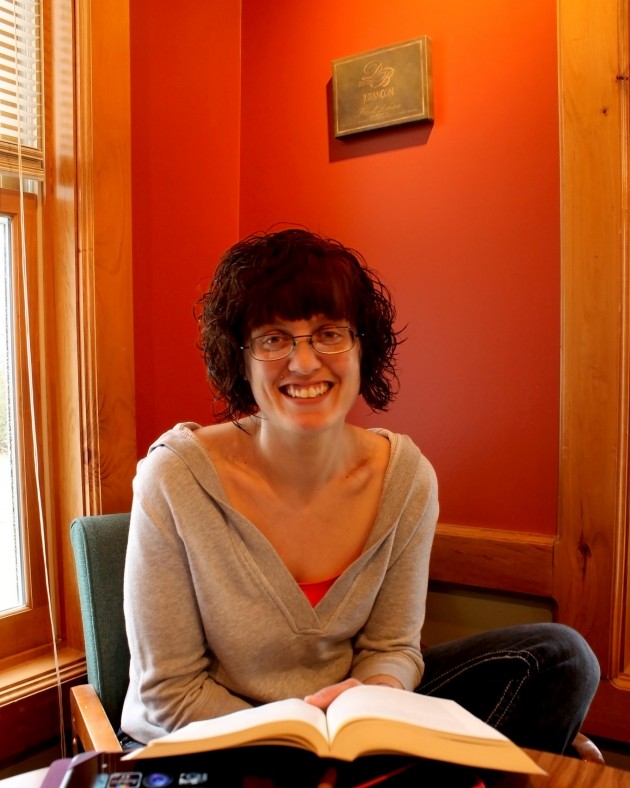Common ground for non-trad students

With a glass of wine in her hand, 33-year-old Elishia Fletcher curls up in her recliner during a rare quiet moment at home and begins chatting about her experiences as a nontraditional student at Castleton State College.
Her eyes grow wide as she describes the “utter chaos” that her life has become, because in addition to school work she is also a single parent to two children.
She describes getting up at 4:30 a.m., getting the kids up and on the bus by 6:50 to be ready to leave around 9 for class, or one of the two jobs she juggles. Some nights she stays awake until midnight or later finishing assignments. Fletcher said she manages this chaos by always putting her family first.
Whether it’s having “mommy and James time” or never missing her daughter’s cheerleading competitions on Saturdays, Fletcher believes that balancing her priorities is what makes her successful as a parent and as a student.
Even though some traditional students are often a decade younger than students like Fletcher, she said she has found common ground with those who are serious about their studies like her.
“I do have some traditional students who I consider friends and I know younger students who just don’t take their education as seriously as an older student does,” she said. “Some students, who may not be as goal oriented, don’t grasp how tough it is. I can’t wait until the last minute to do assignments and if they took a year off from high school before starting college to get a taste of real life, then they wouldn’t blow off class.”
But Fletcher admits that sometimes her life gets in the way of her schoolwork, and it bothers her.
“Sometimes I feel like I haven’t pulled my share of the weight with group projects because I have so many more demands for my time,” she said.
Fletcher is not the only CSC student with the impression that your attitude determines your success.
Kelli Hennessey, a 27-year-old English literature major, thinks that a driven attitude rather than age is what makes you a serious student. Hennessey is also a nontraditional student trying to balance her time between work, parenting and classes, and she does this with a sense of humor.
“Oh those kids,” she says as she rolls her eyes jokingly about her younger classmates. “But I would never say that to them.”
And while Hennessey may want to give advice to her younger classmates, she abstains.
“I think that some older students may be perceived as acting superior and I don’t want to give that impression,” she said
Even though there are times when she notices new students not speaking up in class or acting foolish and wondering why they aren’t taking life more serious, she doesn’t feel she should be the one to chastise them. This is frustrating for her, but she said there are also students who are there for the same reason she is: to get an education.
“I know some very bright and intelligent first -year students who I have become friends with because we have a lot in common academically,” Hennessey said.
Hennessey’s friend and traditional second-year English Literature major Carleigh Ervin is one of them.
“Whether or not freshman are as driven as an older student to be successful seems to have more to do with their brains than their age,” the 23-year-old said. “More serious students do more of the work.”
“It’s a smart people thing, not an age thing,” Hennessey chided in.
Some traditional students agree.
Cameron Scully, a traditional freshman who is a member of the Campus Activities Board and Peer Advocates for Change, talks about what he sees as the strengths and weaknesses during his interactions with nontraditional students.
“Non-traditional students seem to be focused on learning and don’t need the whole college experience, I think that it is also commendable that they are trying to better themselves.” But, he also said the “cultural differences are noticeable.”
Professors wish that some of the younger students, who are more focused on partying, would follow the example given by nontraditional students.
Professor Tom Conroy said he wonders “how they do it” balancing work, kids and school.
“I wish I had more of them, they value their education,” Conroy said.
Professor Robert Wuagneux contends that “a lot of young kids are very serious” but “nontraditional students are much more focused on completing their tasks.”
Emily Wiezalis, assistant dean of enrollment, sees a benefit as a nontraditional student herself in having classes with all types of students.
“You’re enhanced by having an experience alongside a traditional student,” Wiezalis said, adding that “whether you are there to enhance your profile or there for various other reasons, everyone has a different perspective.”
Other staff members agree saying that the benefit of having the multicultural experience is an important indicator for success.
“Know your resources,” said Melissa Paradee, director of student, adding that it’s important to do so even if it’s just to “get to know the person next to you”
Paradee encourages all students to be engaged while in school, even in student government affairs.
“The Student Government Association loves to have people of all ages, but if you can’t engage on that level, because of family or jobs, get to know people in your classes,” she said, because little things make a difference and “feeling like your part of the college community at any age leads to staying in school.”







